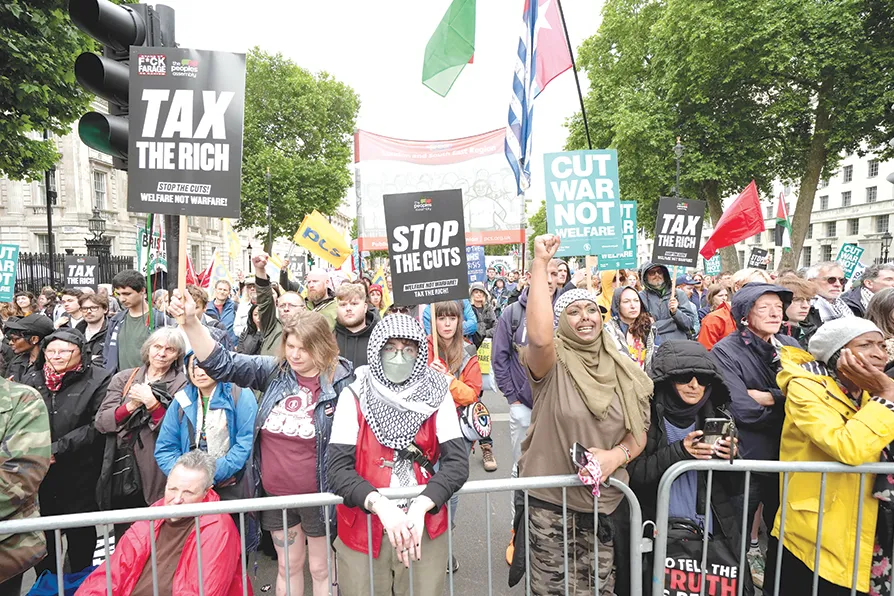Corbyn’s intervention exposes a corrupted system, writes CLAUDIA WEBBE
RICHARD BURGON MP points to the recent relative success of widespread opposition to the Labour leadership’s regressive policies as the blueprint for exacting the changes required to build a fairer society

 WAY FORWARD: People's Assembly Against Austerity protest in central London on June 7 2025
WAY FORWARD: People's Assembly Against Austerity protest in central London on June 7 2025
AS I WRITE this on Wednesday night, the disability cuts Bill has just passed through the House of Commons. I’m so angry at the £2 billion cut imposed on 750,000 low-income sick and disabled people.
These are exactly the people a Labour government should be supporting and protecting — not pushing further into poverty.
As cruel as these changes are — and I opposed them every step of the way — the past few weeks have also shown us something positive: when we build alliances and when we campaign together, we can get the government to shift in the direction people so desperately need.
When the government first introduced this Bill, it proposed nearly £7 billion in cuts to disability support. But thanks to a broad campaign — uniting disability rights activists, social movements and trade unions, and a broad coalition of MPs — we forced £5 billion in concessions.
Our movement also stood firm against the planned cuts to Winter Fuel Payments. After disastrous local election results for Labour in May, the government was forced into a major U-turn there too.
These concessions show what is possible when we bring people and campaigns across our movement together. The government may be lobbied constantly by big money and powerful interests, but we have people power — and we must use it.
Now should be the moment when we commit to broadening and deepening those alliances — bringing together the broad left, trade unionists and grassroots campaigners — to push for a real alternative to cuts and austerity.
That can form a powerful alliance that would reshape the argument, offer alternatives and shift the government on to a better path. That is urgently needed.
Following the disability cuts concessions, ministers claimed they could no longer afford to scrap the two-child benefit cap — a policy that has pushed hundreds of thousands of children into poverty — because the money has now been used to fund changes to disability support.
We must reject such cynical pitting of one group of struggling people against another. The idea that, in the sixth-richest country on Earth, we must choose between help with heating for pensioners, support for disabled people, or lifting children out of poverty is not only false — it’s morally indefensible.
The government continues to claim that these decisions are about closing a “black hole” in the public finances. But no Labour government should ever try to balance the books by forcing disabled people into hardship or condemning children to hunger.
There is always a better alternative, as every trade unionist, Labour member and progressive campaigner knows.
So, I’m also encouraged that a wealth tax, something I’ve long campaigned for, is finally rising up the political agenda. More and more MPs are taking it up, trade union leaders are backing it and even former Labour leader Neil Kinnock is calling for it.
This idea is popular because it addresses the deep inequality in our society. For nearly two decades, workers’ wages have stagnated, public services have crumbled, and our social security system has been dismantled piece by piece.
At the same time, the ultra-wealthy have seen their fortunes soar. Since 2010, billionaire wealth in the UK has surged by 150 per cent — from £250 billion to over £620 billion. Ever-growing inequality means the top 50 richest families in the UK now hold more wealth than the bottom 50 per cent of the population.
More than half of UK billionaires made their fortunes not through productive work or job creation, but through rent extraction — property, inheritance, or financial speculation.
That tells you everything about our economy.
Their growing wealth has little to do with success for the wider economy or ordinary people and everything to do with a rigged system. It’s not just that trickle-down economics doesn’t work, the opposite happens: wealth is hoovered upwards.
People have had enough of all this. They see how the ultra-rich exert too much influence over our politics and democracy. They see how wealth is hoarded at the top, while the rest are told to accept cuts.
They know the system is broken. They are angry. And they’re ready for change.
But just because people are fed up doesn’t mean progressive change will happen automatically.
Those clinging to the rotten status quo — or trying to drag us further backwards — are already organising, trying to direct people’s anger against disabled people, against migrants, and against whoever else can be blamed to distract from the real causes of the crisis people face.
To defeat the threat of a Reform UK government — which would only deepen the crisis facing working people — the Labour Party must offer a genuinely different path. It must learn the right lessons and be prepared to reject the failed politics of the past.
A wealth tax must be at the heart of that vision for the future. That can fund public services, tackle inequality, and rebuild our broken welfare state — not by hitting ordinary working people, but by finally making the super-rich pay their share.
A modest annual wealth tax of just 2 per cent on assets over £10 million would raise an estimated £24 billion a year. And it would affect just 20,000 families — a tiny 0.04 per cent of the population.
Despite the fearmongering of the rich and powerful, the public overwhelmingly supports change. According to a recent TUC poll, two-thirds of people back an annual wealth tax on estates over £10 million. A similar number support a windfall tax on the big banks.
The media and elite voices will try to scare people. We’ve seen it before. Remember the barrage of headlines warning of a millionaire exodus if Labour scrapped the non-dom status for the super-rich?
According to the Tax Justice Network, in 2024 there were an average of 30 stories per day pushing that claim. The truth? Just 0.3 per cent of the UK’s 3 million millionaires left the country. That’s not an exodus — it’s a rounding error.
This is a political fight against the rich and powerful. But it’s one we can win. The wind is in our sails.
We can secure a wealth tax and build a fairer, more equal society — one where the wealth created by working people is used to benefit the many, not enrich the few.
Securing such change starts with us putting forward bold ideas like a wealth tax but also organising the broad alliances we need to win them.

We cannot refuse to abolish the unjustifiable two-child benefit cap that pushes children into poverty while finding billions of pounds for defence spending — the membership and the public expect better from Labour, writes JON TRICKETT MP

In the current climate, it is vital to bust the myths and put forward the case for a humane and decent social security system that supports people, argues FRAN HEATHCOTE

RUBY ALDEN GIBSON believes Scottish parliament has enough powers to curtail Westminster Labour’s savage attack on welfare












